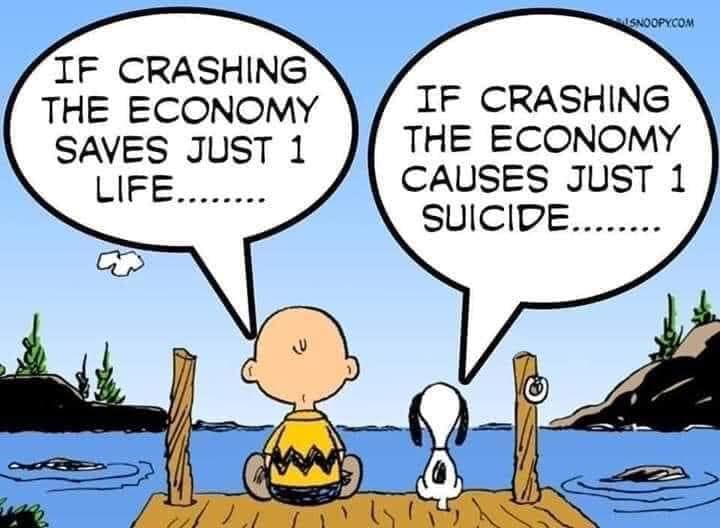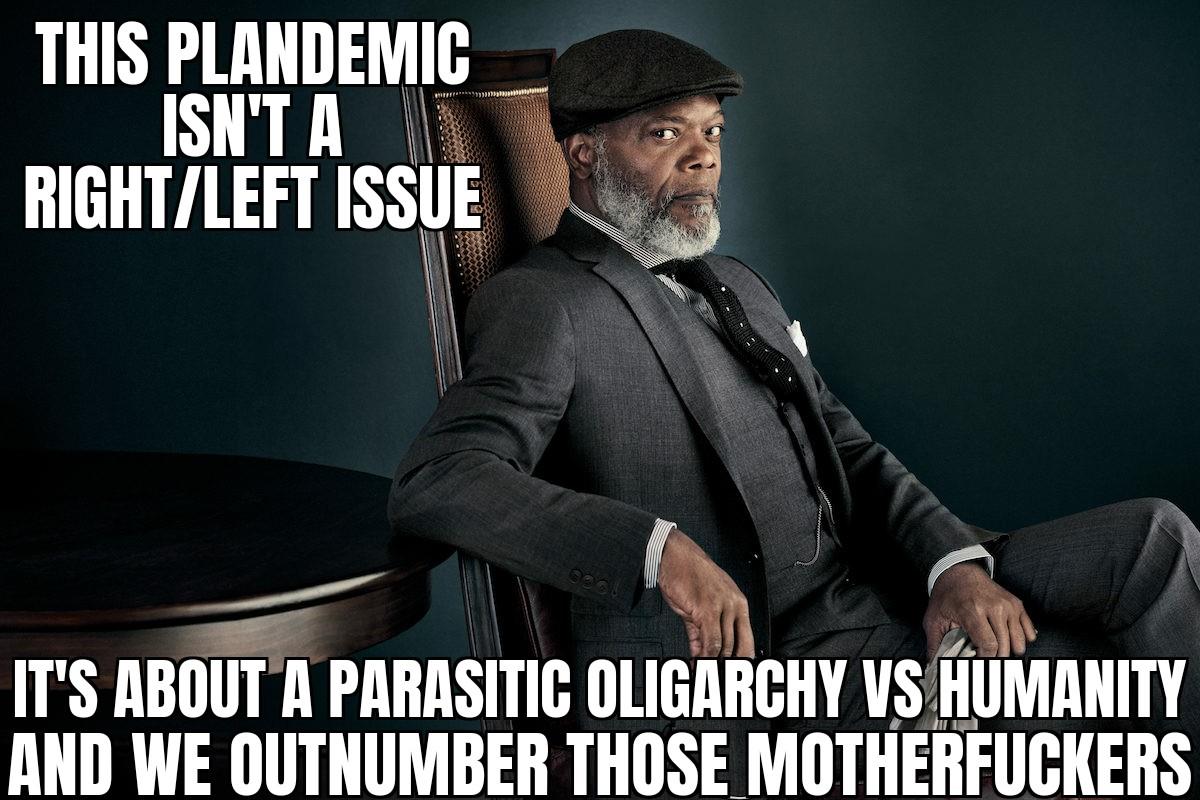


THE COVID19 CRISIS IS A FINANCIAL CRISIS - NOTHING ELSE
The Covid19 crisis is a financial crisis – nothing else. It was fabricated to mesh with the coming new financial crisis. Some of us have said this right from the start.
To understand the nature of this new financial crisis you must see it as another in the sequences of financial crises that have happens since the abandonment of the Bretton Woods system starting in the early 70s. The dates of successive crises are mid 70s, 1989, 1998, 2008, 2020/1. Each is different although they are all part of an underlying trend. And each crisis is substantially worse than the previous one.The 2020/1 will be nuclear in scale and effect.
The Bretton Woods era was a golden age of capitalism. It lasted from 1945 until the mid 70s. We are told that the system ended when Nixon took the dollar off the gold standard in 1971 but this is wrong for it misunderstands the central virtue of Bretton Woods. There were two key aspects.
Yes, the dollar was underpinned by gold reserves [supposedly] held in Fort Knox, USA, but this was of no consequence expect at the beginning, following the end of the war. The real importance of Bretton Woods was the strict exchange controls imposed on all member countries. ThIS meant that when member countries became prosperous, as almost all did, outstanding examples being Germany, the USA, the UK, France, Sweden, Japan and others, the accumulated wealth largely stayed in the country and so it was reinvested in the country leading to a virtuous circle of growth. Laws prevented the wholesale export of wealth.
This meant a complete abandonment of the orthodox Adam Smith economics which said that capital must be free to go where it wants, or where its owners want. Although not stated explicitly it was an adoption of the economics of nineteenth century America and Germany, of Henry Carey and Friedrich List, respectively – figures that have been airbrushed out of economics today.
The principle of this economics is that in order to prosper each country must operate as an economic unit and be allowed to develop a diverse economy within its borders. This does not mean that countries do not trade with each other. International trade can be beneficial but it is not automatically so. Common sense should tell us this. So a degree of “globalisation” is not ruled out, but this concerns trade - not capital movements.

These two aspects of globalisation are almost never spelt out but they are completely different. Bretton Woods restricted capital movements but not international trade and this was its genius. Bretton Woods was destroyed not by Nixon taking the dollar off the gold standard but by cunning subterfuge of the system of exchange controls by operators in the City of London, supported by the British government.
They recognised that there was a weakness in the system because there were a huge number of dollars already outside of the US. How under these circumstances could America effectively maintain capital within its border? These dollars, existing outside of the US, came to be known as Eurodollars and the problem they presented was this. They could be traded and speculated on and so the value of dollars in general varied due to factors quite external [exogamous] to the US economy.
The British government could have stepped in and stopped this trade but as always it favoured its friends in the City over and above the wealth creating real economy. The City traders converted the Eurodollars into “Eurobonds” to increase tradability and speculation and this drove a horse and cart through the Bretton Woods system. It was this not the dollar going off the gold standard that stopped Bretton Woods and all the economic virtues that flowed from it.
Economist and politicians, in the west pronounced the system dead and ushered in a period on unrestricted capital movements and limitless opportunities for speculation and manipulation of markets. This is the background for the series of economic crises I mentioned at the top of the article. Governments started to relinquish exchange controls which had been the fundamental building block of post-war prosperity. The result was that all sorts of economic indicators went array – inflation, balance of payment, value of currencies, etc.

The response in the US, under Treasury Secretary, Paul Volkner and in the UK under PM Thatcher was tight controls of the money supply. This did huge permanent damage to industry but this was not on any concern to the governments implementing these policies. They made matters worse, by bank liberalisation, known in the UK as the Big Bang of 1985. Restraints on bank activity that had served us well were abolished at a stroke.
Money flooded out of the banks into assets, primarily property and the stock market and this stoked the first crisis in the chain which happened in 1989 when the stock market having become overvalued crashed dramatically. Following this the housing market crashed leaving many with negative equity and interest rates climbed to over 12% bankrupting people and businesses.
For our story we must look to the response to this crash. Essentially there was none from government, but the banks responded by calling in loans and seizing the assets guaranteeing those loans. The misery was imposed without any great coordinated effort by government or banks. The banks, of course, survived relatively unscathed.
To understand the next crisis of 1998, you have appreciated how much work was done in the creation of new exotic financial instruments that enabled further wealth extraction from the working economy. Hedge funds had been around since the 1960s but in the 1990s they started to boom and this has never stopped.
What is a hedge fund? How is a hedge fund different from any other financial fund? A pension fund or a unit trust fund, to take two common examples, invest in the normal economic assets – property, shares, bonds. If you consider a traditional bank as a fund, they invest in businesses by way of loans.
Hedge funds do none of these things. They do not really invest in anything, they just speculate. They take up positions on currencies and assets and myriad other things in order to gain from price movements. Hedge funds are pure parasites and like all parasites extract richness and give nothing back.
The other funds I mentioned and the traditional banks play a necessary part in the economy. Hedge funds are scoundrels. All the activities, which I have not room to describe here, they engage in should be made illegal then they would cease to exist. Hedge funds are responsible for the ballooned of speculative money and this lead to the crisis of 1998 when one of the largest hedge funds of the time, US based, Long Term Capital Management became insolvent. If it had been allowed to go bust it would have brought down large parts of the international financial system and so a response was necessary.

In this 1998 crisis, as in the late 80s, the governments played no vital role. After all why should they? This was created by private companies and so private companies should be responsible. To avoid collapse, the big banks and other hedge funds got together and bailed out LTCM and the general public hardly noticed that anything had happened. But it was a dire foreboding of how the financial system was operating.
Parasitic hedge funds were creating fragile financial structures that made them vast fortunes while the going was good but that were essentially unstable. But these new financial instruments were now permeating all of the financial economy. None of them have anything to do with creating real wealth – all they do is blow up existing asset prices or create entirely new asset classes, all of which can be speculated on, making vast fortunes for the hedge funds, banks and their clients.
The next crash of 2008 made 1987 and 1998 look like vicars’ tea parties. This time the debts in the financial system were so enormous that the cosy bail out within the financial sector that has been possible in 1998 was not possible. The banks did not have the liquidity and so they looked to governments and the tax payer to save them from the consequences of their reckless greed.
Our politicians are owned by the City of London and Big Finance and so they did not hesitate to step up with the bail out money. This money was added to the national debt and a long policy of austerity was introduced so that the people were force to suffer bad services and poor employment to finance the superrich domiciled in tax havens. But this would never be enough to save the financial sector. It was and is too rotten for that.
In addition to the bailout the central banks started on a process of printing money and this was called “quantitative easing”, QE. Central bankers of previous ages would have been horrified at this for it is a violation of all the principles of central banking established over the centuries. The central bank quite simply does not interfere in the working of the economy – except as a regulator [in both senses]. The central bank is there to smooth the operation of the economy, nothing more.
QE changed all that and with it we embarked on a process that, whilst it would make fortunes for those close to the issue of money, could only lead to disaster – financial apocalypse. The money supply and all the speculation piled on top of it is now so astronomic that when [not if] it crashes the government will not have enough resource to bail out the losses.
It will have two choices, one, let the banks and hedge funds go bust, or, two, steal money from citizens’ bank accounts to bail out the parasites. No prizes for guessing which way they will go. Which brings me back to the first sentence of this piece “The Covid19 crisis is a financial crisis – nothing else.”
Under normal circumstances, the government dipping into people’s bank accounts would generate a response, even from a thoroughly indoctrinated and downtrodden set of people as we mostly are today. They might come out onto the streets to demonstrate and, horror of horrors, try to withdraw their own cash from their accounts.

But what if the people were locked in their houses, unable to go to work, to go to the shops or the pubs, and even discouraged from seeking their normal medical treatment if it cannot easily be associated with this Covid19 flu?
And what if the police were already on the streets to make sure the lockdown is not violated?
What if the people are scared stiff of a highly contagious, deadly virus that might get them if they step outside the front door?
What if they were trapped in front of a state TV station constantly broadcasting propaganda about conformity to the lockdown and the correctness of the government’s position?
What if any street demonstrations were as a matter of course stopped for violation of the isolation policy?
And what if a cowed population, on top of all that, were facing personal and family financial ruin?
And what if the government refused to set an end date for the isolation compounding the distress?
What if reports on social media that challenged the official narrative were taken down?
What if there were virtually no reports of estimates of the damage the lockdown was doing?
What if the government continued to state that it would be guided by the “science” and only the science – as if this science, whatever it might be, is the only determinant of outcomes?

Then and there, you have a population fully prepared to accept the travails, suffering and loss of hope and loss of future that the sacrifices that are about to be demanded of them, to bail out a corrupt financial system, will entail.
That is the true nature of Covid19. As Ernst Wolff says, the only way to avert any of this is for the people to rise up. But will they?
__________________________________________________________________________________________
JOIN THE CONSTITUTION PARTY HERE
Subscription receipts will be used mostly to finance public meetings in the UK
£10 per year
Reduced rate £1 per year for unemployed, students and international members
_________________________________________

